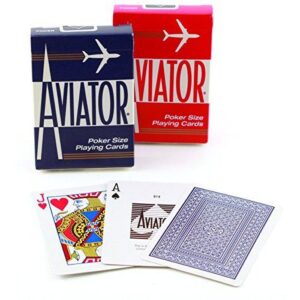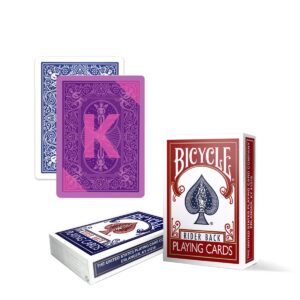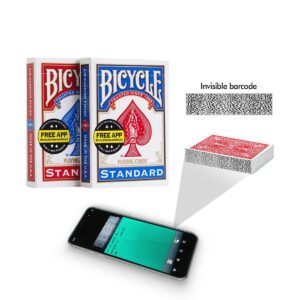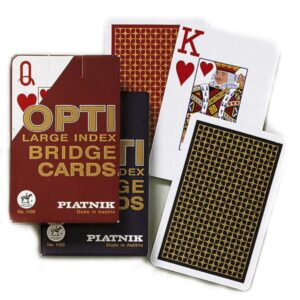O pôquer é um jogo de cartas que exige habilidade. Jogar pôquer envolve muitos aspectos, mas vencer exige ainda mais habilidade. Exige que você entenda psicologia, estratégia e teoria dos jogos. Além disso, você precisa internalizar os padrões das mãos por meio da prática constante. Para vencer no pôquer de forma consistente, você precisa dominar as nuances do jogo, se adaptar aos seus oponentes e tomar decisões ponderadas sob pressão.
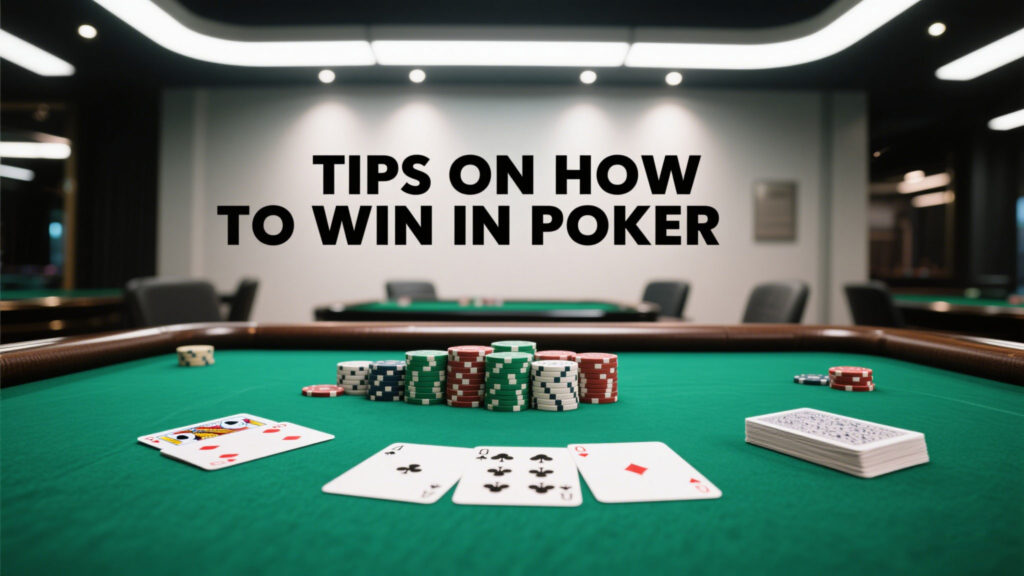
Então, se você quer saber como vencer no pôquer, a resposta é aprender mais rápido e dominar a estratégia passo a passo. Vamos explorar como vencer no pôquer como os melhores jogadores.
Melhores estratégias de pôquer
As dicas de pôquer a seguir são importantes para jogadores de todos os níveis. Elas não são apenas os segredos para vencer no pôquer, mas também a maneira de aprender pôquer.
Dicas e estratégias de pôquer: jogue menos mãos, mas seja agressivo
O segredo para vencer no pôquer é planejar quais mãos você vai jogar antes do flop. Você também precisa saber quais mãos são fortes. Porque mesmo que você seja o melhor jogador de pôquer do mundo, há um limite para o número de mãos que você pode jogar antes do flop. Você não pode jogar todas as mãos boas para vencer. É especialmente importante notar que o No Limit Hold'em requer fichas extras, a menos que você tenha sorte.
É crucial escolher mãos fortes e atacar agressivamente. Mesmo que uma mão não pareça boa à primeira vista, um jogador agressivo usará isso para aumentar suas chances de ganhar. Quando você aumenta, os outros jogadores não conseguem dizer se você tem uma mão boa ou ruim, o que o torna muito difícil de derrotar.
Como vencer no pôquer? Jogue apenas algumas mãos se necessário, mas seja agressivo!
Dicas e estratégias de pôquer: por que você deve evitar o limp aberto no pôquer
Se você for o primeiro jogador no pote, nunca entre de limp. Aumentar a aposta fará com que você perca a chance de ganhar o pote imediatamente, mas também dificultará a entrada de outros jogadores. Espere que outros jogadores entrem. Só então você poderá pagar diretamente, como se estivesse em um overlimp. Isso pode ser uma boa ideia, pois você pode ter sorte no flop sem correr muito risco.
Dicas e estratégias de pôquer: semi-blefe com draw
Blefar no pôquer é uma faca de dois gumes. Se feito incorretamente, é a maneira mais rápida de perder dinheiro na mesa. Se você quer saber como ganhar no pôquer, precisa aprender a blefar com mais frequência.
Como fazer isso? Basta olhar para as cartas na sua mão e deixar que elas decidam. Por exemplo, quando sua mão tiver a chance de ser a melhor mais tarde, talvez quando você estiver perto de completar um straight flush ou flush draw, ou mesmo se você tiver uma ou duas cartas altas que combinem com as cartas da mesa (semi-blefe). Mantenha-as de reserva caso seu blefe seja descoberto.
Dicas e estratégias de pôquer: não exceda seus limites
Jogue sempre dentro dos seus limites financeiros e emocionais. Além disso, aprender a aceitar o fracasso é o segredo para vencer no pôquer. Esteja preparado para perder apenas o que você pode perder. Uma dica comum no pôquer é jogar com buy-ins de pelo menos 20 a 30 em cash games e de 50 a 100 em torneios.
Mantenha a gestão do seu bankroll mesmo quando se sentir frustrado ou confiante demais. Se estiver em uma sequência de derrotas, resista à tentação de aumentar suas apostas para se recuperar rapidamente. Isso pode levar a perdas maiores e colocar seu bankroll em maior risco.
Como parte da sua estratégia de pôquer, mantenha registros detalhados de suas vitórias e derrotas. Isso ajudará você a entender seu desempenho e a tomar decisões informadas sobre quando aumentar ou diminuir suas apostas.
Dicas e estratégias de pôquer: se você não tem certeza, é hora de desistir
Ter uma boa mão é bom para vencer uma partida de pôquer. Mas você não deve ser muito protetor ao jogar com uma boa mão.
Mas a marca registrada de um mestre é que ele consegue parar de jogar mesmo quando tem uma boa mão. Ele sabe que é hora de parar quando alguém tem uma mão melhor.
O controle emocional também é mais difícil de alcançar no pôquer. A maioria dos jogadores é movida pelo desejo de ganhar e pela curiosidade sobre as cartas dos outros jogadores. Motivados por essa paixão, eles estão fadados a perder dinheiro. Jogar demais, especialmente quando não deveria, é a maneira mais rápida de perder dinheiro no pôquer. Se você não tem certeza se deve continuar jogando ou parar, geralmente é melhor parar.
Dica para vencer no pôquer: Quando decidir parar de jogar nessas situações, anote o que aconteceu. Depois, você pode refletir se fez a escolha certa. Isso ajudará você a melhorar seu jogo e a adquirir um conhecimento mais profundo do pôquer.
Dicas e estratégias de pôquer: aposte rápido com mãos fortes para aumentar o pote
Não espere que a melhor mão chegue e lhe dê todo o dinheiro do mundo! Se você tem uma mão que vale a pena jogar, aposte. Alguns jogadores de pôquer tendem a achar que manter suas boas mãos em segredo é uma estratégia inteligente em torneios. Eles esperam e esperam, na esperança de que outros jogadores apostem mais. Mas você pode perder quando deveria ganhar, ou ganhar menos do que realmente ganhou.
Se você tem uma boa mão, mas não tem certeza sobre o jogo do seu oponente, é melhor apostar do que se decepcionar.
Às vezes, faz sentido esperar um pouco antes de fazer uma aposta, nas seguintes situações:
- É improvável que outra pessoa receba uma carta melhor que a sua.
- Não há cartas suficientes para assustar outros jogadores.
- As cartas dos outros jogadores podem não ser muito boas.
Mesmo que as probabilidades estejam contra você, não se preocupe. É melhor encarar a decepção do que perder uma aposta alta. Depois disso, a questão de como vencer no pôquer não será mais tão difícil.
Dicas e estratégias de pôquer: defenda seu big blind com uma boa mão
Ao jogar pôquer, se você estiver na posição de "big blind", já terá algum dinheiro. Isso significa que você pode jogar mais mãos do que o normal, pois custa menos para permanecer na mão. Isso pode não garantir uma vitória no pôquer. Mas entenda que qualquer mão pode ser vencedora. Claro, isso não significa que você deva ser agressivo mesmo se tiver uma mão fraca. O truque do pôquer é jogar mãos com alto valor de fold.
Você pode decidir quantas mãos apostar com base em quem aumenta e onde eles estão, o número de jogadores no jogo, o valor da aposta e quanto dinheiro você e seus oponentes têm restante.
Se você for mais habilidoso, também considerará outras situações sutis de apostas. Quando estiver no big blind, você terá a oportunidade de jogar mais mãos, mas ainda precisará escolher as mãos apropriadas com sabedoria.
Dicas e estratégias de pôquer: aja quando seu oponente parecer vulnerável
Com a popularização do pôquer, mais jogadores se tornaram mestres do que você poderia imaginar. A questão é: quando você joga contra mestres, como vencer? Simplesmente jogue quando eles estiverem em desvantagem.
A maioria dos jogadores não dá check com uma mão que resiste a múltiplas apostas. Quando dão check, geralmente têm uma mão fraca e desistem diante de múltiplas apostas.
Quando seu oponente demonstra fraqueza em um pote heads-up, como dar check no flop e no turn, é hora de adotar uma estratégia de blefe agressiva para sobrepujá-lo. Aposte não apenas com seus semi-blefes, mas também com algumas mãos fracas que tenham bons bloqueadores. Tudo depende da sua capacidade de ler as mãos do seu oponente e usar a estratégia certa na hora certa.
Dicas e estratégias de pôquer: dominando o pôquer: além do básico
Alguns jogadores experientes confiam discretamente na tecnologia para aprimorar seu jogo. Dispositivos como analisadores de pôquer, óculos de tinta invisível e lentes de contato infravermelhas permitem que leiam cartas marcadas e prevejam os resultados dos jogos com rapidez e precisão. analisador de poker pode escanear os cartões e fornecer resultados em tempo real por meio de um fone de ouvido oculto, funcionando essencialmente como uma calculadora de probabilidades portátil. Óculos de tinta invisíveis permitem que o usuário veja marcações especiais no verso das cartas sob comprimentos de onda específicos de luz, oferecendo uma vantagem visual que permanece indetectável para outros. Lentes de contato infravermelho vá ainda mais longe — oferecendo uma maneira totalmente prática e perfeita de detectar marcas invisíveis, com aparência totalmente natural.
Cartas marcadas por infravermelho e cartas marcadas por código de barras: uma comparação abrangente
Dicas e estratégias de pôquer: não copie apenas o jogo
Jogadores profissionais de pôquer podem usar estratégias diferentes das tradicionais. Se você não sabe o porquê, não os imite cegamente. Se você não sabe jogar pôquer com inteligência, não jogue.
Por exemplo, um jogador médio pode aumentar com 9♠7♠ em posição inicial simplesmente por tédio ou por querer agir. No entanto, um jogador de pôquer experiente pode fazer isso se notar uma mesa passiva com jogadores mais fracos nos blinds, tornando-se uma jogada potencialmente lucrativa mesmo com as regras normais.
A habilidade fundamental no pôquer é ter um bom motivo para romper com sua estratégia padrão. Se você não tem experiência suficiente para avaliar a situação corretamente, jogue partidas gratuitas e pratique mais antes de tentar jogar de forma mais inteligente.
Dicas e estratégias de pôquer: jogou bem no início do torneio
Ao começar a jogar um torneio de pôquer, é considerado sensato jogar pelo seguro e guardar suas fichas. Mas esse não é o segredo para vencer no pôquer. Sempre considere que você precisa de pelo menos duas ou três vezes o seu stack inicial, talvez mais!
Quando você tem poucas fichas e está prestes a perder dinheiro, é preciso proceder com cautela.
Lembre-se: você precisa jogar forte no início para ganhar mais fichas. Perto do final do torneio, quando estiver com poucas fichas, adote uma estratégia defensiva de pôquer.
Dicas e estratégias de pôquer: adote uma estratégia consistente
Aprender todas as estratégias vencedoras e aplicá-las de uma só vez não é a maneira de vencer no pôquer. Se você tem uma estratégia vencedora que seja fácil de entender e executável, use-a consistentemente.
Não tente mudar sua estratégia só porque está entediado ou chateado, como por exemplo, desistir de uma mão ruim antes de conseguir uma boa. O segredo para vencer no pôquer é usar a mesma estratégia repetidamente, independentemente de como o jogador se sente ou se ganhou ou perdeu recentemente.
O pôquer leva muito tempo para ser dominado. Você precisa economizar dinheiro e encontrar o estilo de jogo que funciona melhor para você.
Dicas e estratégias de pôquer: entre no jogo com a mentalidade certa
Não se esforce demais para ganhar sempre. Embora a quantia de dinheiro que você pode ganhar dependa de suas habilidades no pôquer, certifique-se de que o jogo em si seja divertido e prazeroso, especialmente online. A melhor maneira de ganhar no pôquer é se divertindo jogando. Isso ajudará você a aplicar estratégias de diferentes maneiras e a manter o entusiasmo constante, mesmo que esteja fadado a perder.
Quando você está entediado, ansioso, deprimido ou simplesmente perdendo o controle das suas emoções, você perde mais do que apenas dinheiro. Como ganhar no pôquer quando está perdendo o controle das suas emoções? Simplesmente desista. Isso não só economizará dinheiro, como também lhe ensinará a controlar as emoções em sua vida.
Para avaliar a situação, imagine que você está prestes a jogar pôquer e perde todo o seu dinheiro na primeira mão. Se isso não lhe parece uma boa ideia, então você ainda não está pronto para jogar.
Dicas e estratégias de pôquer: jogue apenas jogos bons
A maioria dos jogadores de pôquer tenta desafiar jogadores melhores desde o início e está fadada a perder. Talvez queiram provar seu valor. Mas se for por dinheiro, essa não é uma boa estratégia. Ao jogar jogos de apostas baixas ou se divertir, simplesmente experimente.
Se você quer jogar com dinheiro de verdade, junte-se aos jogos certos, onde os jogadores são melhores que a metade deles ou até piores. Isso vai te ensinar como vencer no pôquer, te fazer ganhar dinheiro e aumentar sua confiança.
Claro! Para um iniciante, é mais importante ter confiança para vencer do que tentar derrotar o oponente no primeiro dia. Nunca deixe seu ego tomar conta de você. Sempre escolha posições que lhe deem uma chance de vencer. Não há nada de errado nisso.
Dicas técnicas de pôquer
- Aprenda a classificação das mãos de pôquer e jogue-as com frequência para internalizá-las.
- Domine os cálculos de probabilidades do pote para tomar decisões inteligentes de apostas.
- Aprenda técnicas de gestão financeira para manter a lucratividade a longo prazo.
- Leia os padrões de apostas para identificar as tendências do seu oponente.
- Entenda o conceito de probabilidades implícitas em um empate.
Conclusão
Você está pronto para dominar a mesa?
Com essas estratégias de pôquer vencedoras, você pode superar seus oponentes e melhorar suas chances. Lembre-se: pôquer é um jogo de habilidade, estratégia e paciência. Se tiver sorte, embaralhe, distribua as cartas e deixe que seu novo conhecimento o leve à vitória. As cartas estão em suas mãos!
Perguntas frequentes sobre dicas e estratégias de pôquer
Qual é a estratégia de pôquer mais importante para iniciantes?
Iniciantes devem se concentrar em jogar menos mãos, mas de forma agressiva. Escolher mãos iniciais fortes e pressionar nas apostas é fundamental.
Por que devo evitar o limp aberto no pôquer?
Abrir o limp deixa você vulnerável, pois sinaliza fraqueza e dá aos oponentes maiores chances de pagar ou aumentar a aposta. Aumentar a aposta, por outro lado, permite que você assuma o controle do pote mais cedo.
Como o semi-blefe pode me ajudar a ganhar mais?
O semi-blefe com uma mão de draw lhe dá duas maneiras de vencer: forçando uma desistência ou melhorando sua mão mais tarde na rodada.
Qual é o papel do controle emocional no pôquer?
Disciplina emocional é essencial. Saber quando desistir — mesmo com uma mão aparentemente forte — pode evitar grandes perdas e manter a lucratividade a longo prazo.
Como devo administrar meu bankroll de pôquer?
Siga um plano estruturado de gestão de bankroll: pelo menos 20 a 30 buy-ins para cash games e 50 a 100 para torneios. Nunca jogue com dinheiro que você não pode perder.
O que são ferramentas de trapaça no pôquer e como alguns jogadores as utilizam?
Alguns jogadores avançados usam ferramentas como analisadores de pôquer, lentes de contato infravermelhas ou óculos de tinta invisível para obter uma vantagem oculta ao ler cartas marcadas. Essas ferramentas podem aprimorar sua tomada de decisão em tempo real.
Devo copiar estratégias de jogadores profissionais?
Não sem entender por que as usam. Copiar táticas avançadas às cegas e sem contexto pode ser arriscado se você não tiver habilidade ou noção do jogo.
Qual é o melhor momento para ser agressivo em um torneio?
No início do torneio, é importante jogar forte e construir sua pilha de fichas. Não jogue apenas na defensiva — acumular fichas lhe dará opções mais tarde.
Como sei quando blefar?
Blefe quando seu oponente demonstra fraqueza — como dar check várias vezes em um pote mano a mano — e principalmente quando sua mão tem bons bloqueadores ou potencial de draw.
Como posso manter a consistência da minha estratégia?
Escolha uma estratégia adequada ao seu nível de habilidade e orçamento e mantenha-se fiel a ela. A consistência ajuda a eliminar erros impulsivos e constrói sucesso a longo prazo.








